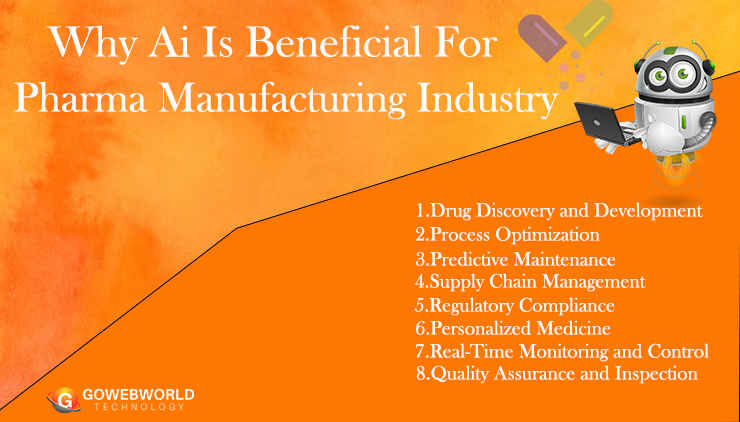Artificial Intelligence (AI) offers several benefits to the pharmaceutical manufacturing industry. Here are some ways AI is beneficial for pharma manufacturing:
1.Drug Discovery and Development: AI can accelerate the process of drug discovery and development by analyzing vast amounts of biomedical data, scientific literature, and clinical trial results. Machine learning algorithms can identify patterns and relationships in data to identify potential drug targets, optimize drug candidates, and predict their efficacy.
2.Process Optimization: AI can optimize various manufacturing processes, such as formulation development, dosage calculations, and quality control. By analyzing real-time data from sensors and instruments, AI can identify process inefficiencies, reduce waste, and improve product quality. This leads to cost savings and increased production efficiency.
3.Predictive Maintenance: Pharmaceutical manufacturing involves complex machinery and equipment. AI can leverage predictive analytics to monitor equipment health, detect anomalies, and predict maintenance requirements. By identifying potential equipment failures in advance, manufacturers can minimize downtime, reduce costs, and prevent production delays.
4.Supply Chain Management: AI can enhance supply chain management in the pharmaceutical industry. By analyzing historical data, demand patterns, and market trends, AI algorithms can predict demand fluctuations, optimize inventory levels, and improve distribution strategies. This helps to prevent stockouts, reduce wastage, and ensure timely delivery of medicines to patients.
5.Regulatory Compliance: The pharmaceutical industry is highly regulated, and adherence to quality standards is crucial. AI can assist in automating compliance processes, ensuring that manufacturing operations meet regulatory requirements. AI-powered systems can monitor and analyze data in real-time, helping to identify and prevent deviations, thereby ensuring product safety and regulatory compliance.
6.Personalized Medicine: AI can contribute to the development of personalized medicine by analyzing patient data, genetic information, and clinical records. This enables the identification of patient subgroups that respond better to specific medications, leading to more targeted and effective treatments. AI can also assist in predicting adverse drug reactions and drug interactions, thereby improving patient safety.
7.Real-Time Monitoring and Control: AI can enable real-time monitoring and control of manufacturing processes, ensuring optimal conditions and reducing the risk of errors. By integrating AI with Internet of Things (IoT) devices and sensors, manufacturers can gather data on parameters such as temperature, humidity, and pressure. AI algorithms can then analyze this data and make necessary adjustments to maintain consistent and high-quality production.
8.Quality Assurance and Inspection: AI-powered vision systems can perform automated quality inspections on pharmaceutical products, ensuring compliance with strict quality standards. Machine learning algorithms can analyze images and detect defects, inconsistencies, or contaminants that may not be easily identifiable by human inspectors. This helps to improve product quality, reduce recalls, and enhance overall safety.
9.Drug Repurposing and Combination: AI can assist in the identification of potential new uses for existing drugs or combinations of drugs. By analyzing vast amounts of scientific literature, clinical trial data, and molecular information, AI algorithms can suggest novel therapeutic uses for drugs or identify synergistic combinations that may have beneficial effects for certain diseases. This approach can accelerate the discovery of new treatments and expand the applications of existing drugs.
10.Data Analysis and Decision Support: The pharmaceutical industry generates massive amounts of data, including clinical trial results, patient records, and scientific literature. AI can analyze and interpret this data, extracting valuable insights and supporting informed decision-making. For example, AI can help researchers identify relevant patient populations for clinical trials, optimize trial design, and analyze trial outcomes more efficiently.
11.Drug Safety and Pharmacovigilance: AI can enhance drug safety monitoring and pharmacovigilance efforts by analyzing real-world data, including adverse event reports, social media posts, and patient forums. AI algorithms can detect patterns and signals that may indicate potential adverse drug reactions or safety concerns. This enables faster identification of drug risks and timely interventions to ensure patient safety.
12.Virtual Assistants and Chatbots: AI-powered virtual assistants and chatbots can enhance customer support and interaction in the pharmaceutical industry. They can provide accurate and personalized information about medications, dosages, and potential side effects. Additionally, virtual assistants can help streamline administrative tasks, such as appointment scheduling, medication reminders, and patient education.
These are just a few examples of how AI is beneficial for the pharmaceutical manufacturing industry. The application of AI has the potential to revolutionize drug discovery, manufacturing processes, quality control, and patient care, ultimately leading to improved health outcomes and more efficient healthcare delivery.
Overall, AI has the potential to revolutionize the pharmaceutical manufacturing industry by speeding up drug discovery, optimizing manufacturing processes, improving quality control, and enhancing supply chain management. It can lead to cost savings, increased efficiency, improved patient outcomes, and the development of innovative therapies.

